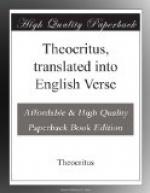Through flank and navel, sundering with swift stroke
His vitals: Lynceus tottered and he fell,
And o’er his eyelids rushed the dreamless sleep.
Nor did their mother see her elder son
Come a fair bridegroom to his Cretan home.
For Idas wrenched from off the dead man’s tomb
A jutting slab, to hurl it at the man
Who had slain his brother. Then did Zeus bring aid,
And struck the marble fabric from his grasp,
And with red lightning burned his frame to dust.
So doth he fight with odds who dares provoke
The Tyndarids, mighty sons of mighty sire.
Now farewell, Leda’s children: prosper aye
The songs I sing. What minstrel loves not well
The Tyndarids, and Helen, and the chiefs
That trod Troy down for Menelaeus’ sake?
The bard of Chios wrought your royal deeds
Into his lays, who sang of Priam’s state,
And fights ’neath Ilion’s walls; of sailor Greeks,
And of Achilles towering in the strife.
Yet take from me whate’er of clear sweet song
The Muse accords me, even all my store!
The gods’ most precious gift is minstrelsy.
IDYLL XXIII.
Love Avenged
A lad deep-dipt in passion
pined for one
Whose mood was
froward as her face was fair.
Lovers she loathed, for tenderness
she had none:
Ne’er knew
what Love was like, nor how he bare
A bow, and arrows to make
young maids smart:
Proof to all speech, all access,
seemed her heart.
So he found naught his furnace
to allay;
No quiver of lips,
no lighting of kind eyes,
Nor rose-flushed cheek; no
talk, no lover’s play
Was deigned him:
but as forest-beasts are shy
Of hound and hunter, with
this wight dealt she;
Fierce was her lip, her eyes
gleamed ominously.
Her tyrant’s-heart was
imaged in her face,
That flushed,
then altering put on blank disdain.
Yet, even then, her anger
had its grace,
And made her lover
fall in love again.
At last, unable to endure
his flame,
To the fell threshold all
in tears he came:
Kissed it, and lifted up his
voice and said:
“O heart
of stone, O curst and cruel maid
Unworthy of all love, by lions
bred,
See, my last offering
at thy feet is laid,
The halter that shall hang
me! So no more
For my sake, lady, need thy
heart be sore.
Whither thou doom’st
me, thither must I fare.
There is a path,
that whoso treads hath ease
(Men say) from love; Forgetfulness
is there.
But if I drain
that chalice to the lees,
I may not quench the love
I have for you;
Now at your gates I cast my
long adieu.




